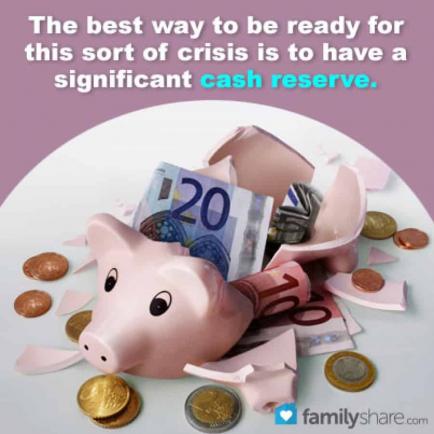
Tragically, life will sometimes present you with seemingly insurmountable problems. Sometimes, life's tragedies come with a price tag. A hefty price tag.
Imagine your child fighting a battle with cancer that, despite insurance, requires you to pay $25,000 for medical bills. Could you imagine having a son or daughter with a drug problem? Have you ever checked out the cost of rehab? How would you come up with the money? The following ideas may help you to survive the financial side of a personal tragedy.
Plan ahead
The best way to be ready for this sort of crisis is to have a significant cash reserve. Maintaining a one year cushion should be your goal. That cushion can absorb all sorts of crises, allowing you to focus on the human side of a crisis rather than the financial side.
Insure the risks you can
You can't insure against every risk, but you can insure many risks. Don't hang on to risks you can't afford. Talk to your insurance agent today.
Use your retirement savings
Don't use your retirement savings to replace your car after an accident - that isn't a real crisis. Don't use your retirement savings to fund elective surgery - it's not a crisis. You may be able to borrow from your 401k without penalty. You can always withdraw money from an IRA, but be prepared to pay the 10% penalty plus tax.
Borrow against your home equity
Home equity is fleeting. Borrowing against it is risky and unwise in all but the most dire of circumstances. Don't borrow against your home to buy a new car or pay for a vacation. Be cautious about borrowing for home improvements - improvement is in the eye of the beholder. If you don't have the ability to borrow from your 401k in a crisis, your home equity may be a refuge.
Try crowdfunding
There are countless web sites for people to raise money from their friends for all sorts of causes, from movies to charitable causes. One of these sites, GoFundMe, is focused on helping people raise money from their friends in a crisis. You'll be amazed at what your friends are willing to do for you in a pinch.
Work out a plan
Sometimes the nature of the crisis, say a large medical bill for a now resolved (or ended) health problem, leaves you with a big pile of bills. You may be able to work out a payment plan with key healthcare providers. If you've been wiped out, they don't have a choice but to accept your plan.
Consider bankruptcy
Filing bankruptcy won't provide the resources you need to put your teen in rehab, but it will stop the calls and end the pain associated with a big medical bill. Talk to a bankruptcy attorney if your assets and income just aren't sufficient to deal with the bills your crisis created. Prudent living can help you avoid bankruptcy, but sometimes there simply is no alternative - through no fault of your own.
Solving the financial problems associated with a family crisis can be daunting and every discussion around money feels like salt being rubbed in the wound. By doing your best and drawing upon the first six items in the plan above, you can generally avoid the seventh. It may seem overwhelming, but you can get through it.

